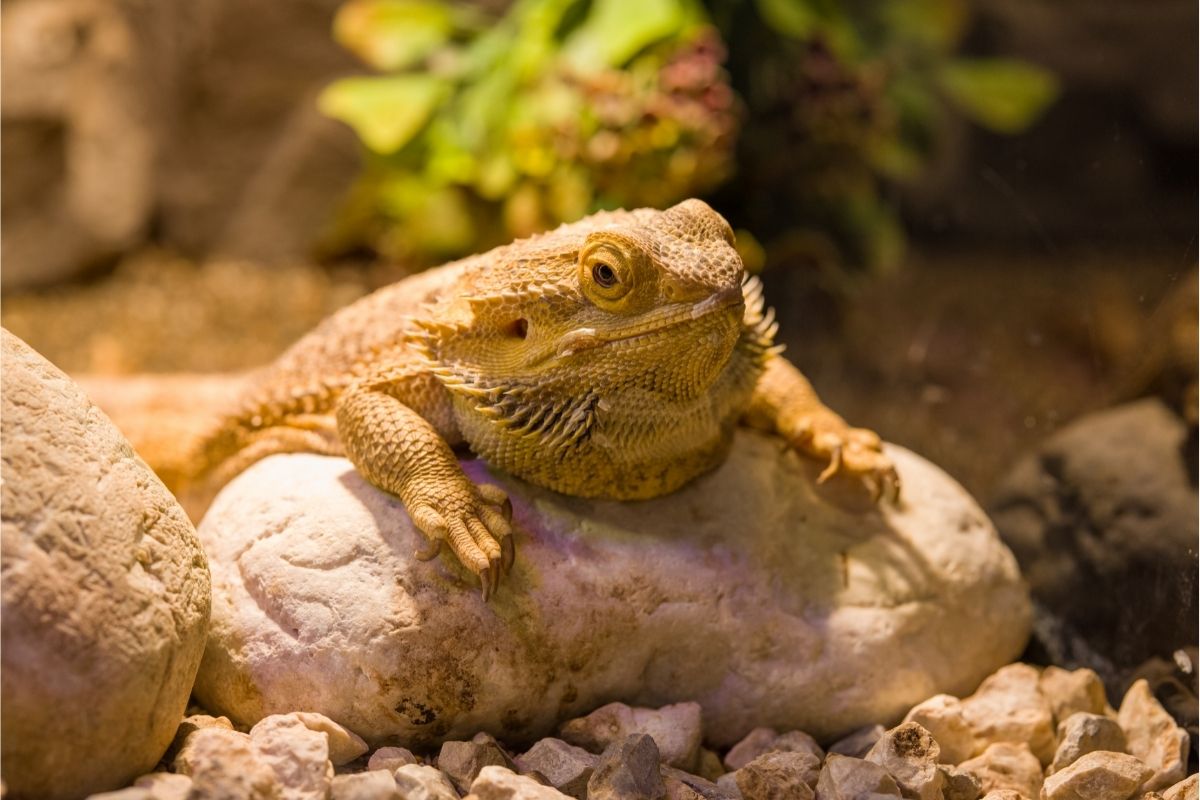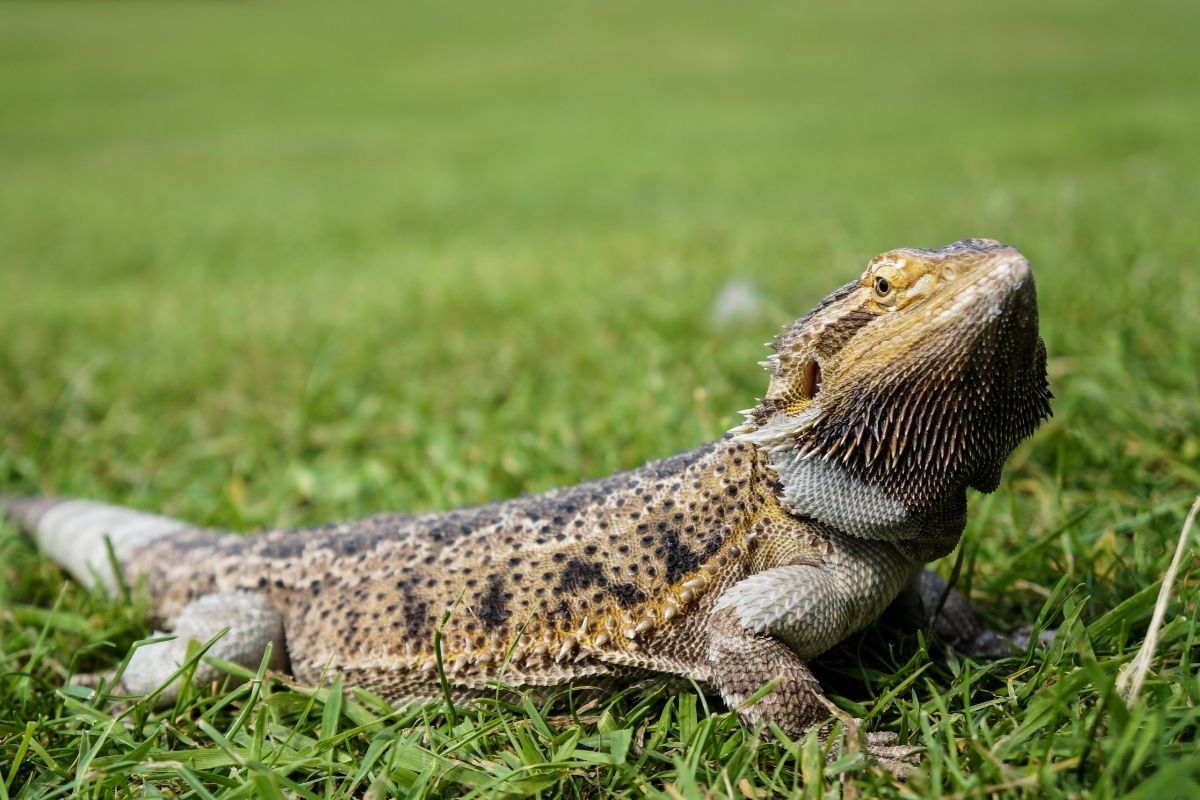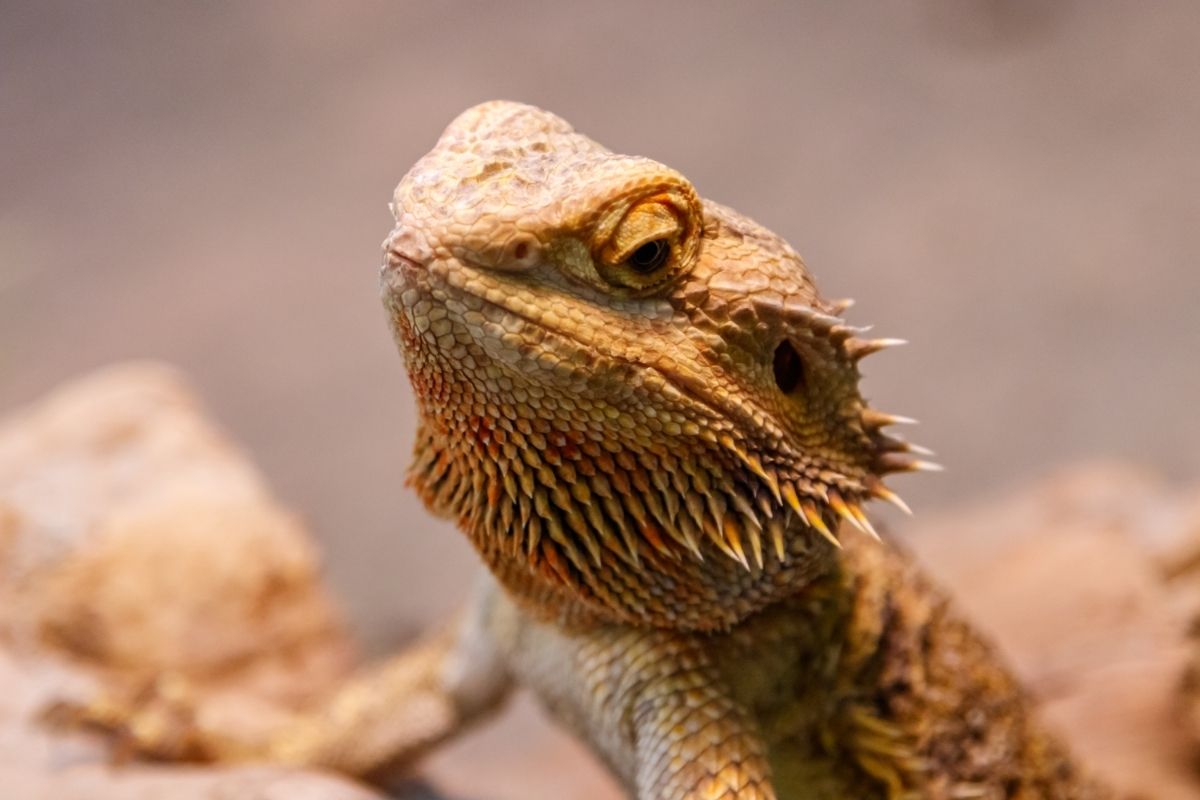Bearded dragons are often considered as cute pets, but they can also be quite challenging to care for.
They require a lot of attention and patience, especially when they are young.

If you want to raise them properly, you should know their behavior patterns and habits – and this includes knowing and understanding how to keep them stimulated and engaged.
In this article, we will cover everything you need to know about caring for your dragon – including the importance of regular stimulation to prevent boredom and frustration.
What Are Bearded Dragons?
Bearded dragons are reptiles belonging to the dragon family.
They are native to Australia and New Guinea.
The species has two subspecies: P. vitticeps and P. porcatus.
The bearded dragon is one of the most popular pet animals in the world.
It is small, easy to maintain, and very friendly.
They have long bodies with large heads.
Their scales are shiny and black or brownish-black, while their tails are usually short and covered by spines.
Dragons can grow up to around 10 inches (25 cm) long.
Males weigh between 0.3 and 1.2 kg (0.6 – 2.7 lb), while females weigh between 0.4 and 1.1 kg (0.9 – 2.5 lb).
Their diet consists mainly of insects and other invertebrates, and it is important that you provide them with proper nutrition.
Caring For A Bearded Dragon
Caring for your bearded dragon is not difficult if you follow some simple rules.
You just need to make sure that they get enough food, water, and space.
It is very important to provide your bearded dragon with a safe environment where he feels comfortable and secure.
This means that you should avoid placing him in an aquarium or cage where there are sharp edges.
Also, don’t place him near heaters or fans because these things may cause overheating.
It is recommended that you use a reptile terrarium instead of keeping your bearded dragon in a glass tank.
Reptiles like to feel enclosed and protected from outside elements.
You should also ensure that your bearded dragon gets plenty of exercise and playtime.
This way, he will stay healthy and active.
Enclosures For Bearded Dragons
Another important factor is to ensure that your beardie has an appropriate enclosure.
Your bearded dragon needs somewhere where it can feel comfortable and protected.
A good enclosure should allow your dragon to move around freely without getting injured.
It should also allow it to climb, dig and bask safely.
An ideal enclosure for a bearded dragon would be made of wood or plastic and should measure at least 30 x 15 cm.
A bigger enclosure would provide more room for your dragon to stretch out and relax, and you must always ensure that any enclosure is large enough for your bearded dragon to turn around and move in total comfort.
It should also have a hiding spot for your dragon to retreat to if they get scared or upset.
Heating
Some enclosures come equipped with heaters, but this isn’t always necessary as long as the temperature within the enclosure is comfortable and suitable for your dragon at all times.
However, if you do decide to use a heater, make sure that it doesn’t emit harmful fumes.
Heaters can be used to give your bearded dragon a little extra warmth during cold days.
If you live in a colder part of Australia, you can leave your bearded dragon outside overnight.
Just remember to bring them indoors before sunrise.
Bearded dragons don’t like being kept inside when temperatures drop below 50°F.
The best way to keep your bearded dragon warm is to provide them with a heated terrarium.
Heated terrariums are available from reptile stores and online retailers.
If you choose to buy one, make sure that it comes with a thermostat, as well as a timer so that you can adjust the temperature accordingly.
In addition to heating, there are other ways to keep your bearded dragon happy and healthy.
Feeding
Your bearded dragon needs to eat every day, and it should be fed a diet rich in protein.
This includes fish, meat, eggs, insects, crickets, worms, fruit, and vegetables.
Your bearded dragon should be given plenty of fresh water daily.
Basking
Your bearded dragon should spend time basking in the sun.
Basking helps to regulate their body temperature and allows them to stay cool and relaxed.
They may also enjoy having a bit of shade under trees or on rocks.
Exercise
Your bearded dragon needs exercise too!
They will benefit from regular walks around the house, or even short trips outdoors.
Give your bearded dragon some space to run around and explore, and let them know what’s going on in the world by talking to them.
You can also encourage your bearded dragon to play by giving them toys such as balls, ropes, tunnels, and climbing frames.
Enrichment
Enrichment refers to providing your bearded dragon with things to stimulate their senses.
These include plants, logs, sand, gravel, soil, pebbles, sticks, leaves, mosses, shells, and stones.
Enrichment provides your bearded dragon with something to chew on and keeps them occupied while you’re busy doing other things.
What Do Bearded Dragons Eat?

Bearded dragons eat insects, spiders, worms, snails, slugs, frogs, grasshoppers, and crickets.
If you want to feed your bearded dragon live foods, then you should start with insects such as mealworms, waxworms, cockroaches, and moths.
If you prefer frozen foods, then you should choose freeze-dried crickets, beetles, ants, locusts, grasshoppers, caterpillars, and more.
Some people even feed their bearded dragons with rodents like mice and rats.
However, this is not advisable because it could lead to health problems.
How To Feed Your Bearded Dragon
When feeding your bearded dragon, you should always remember that he needs a balanced diet.
This means that you should provide him with both protein and carbohydrates.
Protein provides energy to his body, while carbohydrates help him absorb nutrients and build muscles.
Protein sources include meat, fish, eggs, milk, cheese, nuts, seeds, and soybeans.
Carbohydrates come from fruits, vegetables, cereals, bread, pasta, rice, oats, and potatoes.
In addition, you should give your bearded dragon a variety of different types of foods so that he can try new tastes.
Also, you should never force your bearded dragon to eat something that doesn’t taste good to him.
If he refuses to eat certain foods, then you should remove them from his diet until he starts eating again.
Many beardies also enjoy fruits and vegetables, and these are important for helping your pet to stay happy and healthy.
The best time to feed your bearded dragon is when the weather is warm.
During the winter months, you should keep him inside a heated room so that he won’t overheat.
Signs Of Stress In Bearded Dragons
Stress is one of the most common causes of death among reptiles.
It can be caused by many factors including improper care, overcrowding, and being kept in poor conditions.
There are several signs that show that your bearded dragon is stressed out.
These include:
Lack Of Appetite
If your bearded dragon seems to have gone off their food or seems to have lost their appetite, stress could be the culprit.
In some cases, a beardie failing to eat properly can also be a sign that they are too cold – their appetites are hugely impacted by the temperature of their environment.
Take care to adjust both the hygrometer and thermometer and aim to keep the basking area that you provide within the enclosure at around 95 to 110 degrees Fahrenheit.
This will keep your bearded dragon comfortable and calm.
Excessive Urination Or Defecation
Your bearded dragon might seem to be urinating or defecating excessively if they are under too much stress.
Keep a closer eye, and if their digestive or toileting behaviors appear to change, your pet could be suffering from stress.
Aggressive Behavior
If your bearded dragon shows aggressive behavior towards other animals or humans, then it’s probably due to stress.
This should be tackled by giving him some space and attention.
You should also double-check the enclosure – in some cases, beardies can become stressed if there are crickets left over in their enclosure, as these tend to bite.
It is also important to ensure that there are not too many beardies in one enclosure, as this can increase stress.
Some of the most common forms of aggressive behavior include biting, head butting, and tail flicking, as well as your dragon puffing their beard up.
They may also bob their head and open their mouth as a warning.
Skin Lesions
Beardies can sometimes develop skin lesions called alopecia.
This usually happens after they’ve been kept for a long period of time without enough sun exposure, and can be a result of stress and anxiety in your dragon.
Increased Heart Rate
Another symptom of stress is an increased heart rate.
If your bearded dragon has a higher than normal heart rate, then this may indicate that they’re stressed out.
It is important that you take the relevant steps to calm them down as quickly as possible, or they are at risk of longer-term damage and injury.
Stress Marks
If your bearded dragon has any marks on its skin, these may be signs of stress.
You should take note of these marks so that you know what’s causing them.
Stress marks often appear as oval-shaped, dark marks, or, in some cases, dark lines which may resemble the stripes of a tiger.
They will usually appear on the belly, limbs, and chin, and are a key sign that something is not quite right with your dragon.
Stress marks are common in beardies who have recently moved to a new place – acclimatizing to a new environment can be a challenge and, in some cases, cause a lot of stress.
Stress marks can last for up to a month in some cases, though others can subside within a few hours.
You can help to reduce stress for a new beardie by ensuring that their enclosure has everything they need, and ensuring that your dragon has a safe, secure place to hide.
Your bearded dragon should always have access to food, water, and shelter.
How To Calm A Stressed Bearded Dragon

When your bearded dragon is showing signs of stress, it’s important to act fast.
The best way to deal with stress is to provide your dragon with plenty of opportunities to relax.
Give Them Places To Hide
One way to reduce stress in beardies is to give them lots of toys and hiding places.
These things will give your bearded dragon somewhere to hide when he feels anxious and allow them to get away from stressful situations.
Give Them Plenty Of Fresh Air
As we mentioned earlier, your bearded dragon needs to breathe and exercise regularly to stay healthy.
Make sure that they have access to a large terrarium with a good airflow, and that there is good circulation of fresh, clean air.
Keep Them Active
Exercise is great for keeping your bearded dragons happy and healthy.
Try taking them outside for short walks around the garden or even go swimming!
Reduce Handling
Just like humans, many beardies reach a point where they just no longer want to be touched, and if you notice your dragon trying to get away from you, there could be a number of causes, including feeling unwell or sick, being in pain, feeling defensive, or a lack of trust of you and other humans.
It is important that you do not force your bearded dragon to interact with you, but instead try to make them comfortable.
Rather than attempting to touch them directly, you can try simply placing your hand in their tank, palm up, for several minutes.
This will help your dragon get used to your presence, and send a clear signal that you have no intention of hurting them or causing them pain.
It keeps everything on their terms and gives them a chance to get used to you being close.
One way to help your beardies overcome relocation stress faster is by trying to make them feel more comfortable in both their environment and you as their owner.
This is also one way you can bond with your pet, and ensure that they are as calm and comfortable as possible.
One way to do that is by making them use your scent.
Place an article of your clothing inside their cage so they’re able to more quickly get used to your scent in their own time, and at their own pace.
Not only does this help them to bond with you, but it also helps to reduce their stress levels.
The Reasons Why Bearded Dragons Get Bored
Bearded dragons are intelligent creatures, and there are a number of reasons why they may feel bored or frustrated.
Some of these include:
Not Getting Enough Exercise
If your bearded dragon doesn’t get enough exercise, they won’t be able to keep fit and healthy.
If they don’t get any physical activity, they’ll start to lose muscle mass, which can lead to weight loss and poor health.
If your bearded dragon isn’t getting enough exercise, it might become overweight.
Being overweight can cause problems such as joint stiffness, heart disease, and diabetes.
Lack of activity is also a major contributor to boredom, and your pet may eat more to try and alleviate this lack of stimulation.
Lack Of Attention From Humans
Your bearded dragon may not always get the attention they need from you.
They may feel neglected if you spend all day working, playing video games, or watching TV, leaving little time for them.
Lack Of Social Interaction With Other Animals
Another reason why some bearded dragons may feel bored is that they don’t get enough social interaction with other animals.
If they don’t see other reptiles or amphibians, they may feel lonely and isolated.
If you suspect that your bearded dragon is suffering from boredom, you should take steps to remedy the situation.
You should first assess whether your bearded dragon has access to sufficient food and water and if they are receiving adequate care.
You should then think about what activities would benefit your bearded dragon.
For instance, you could play music, read books, watch videos, or even give them a special treat.
You should remember that your bearded dragon needs to be left alone when they are sleeping, eating, or grooming.
When your bearded dragon feels relaxed, it’s easier for them to cope with stressful situations.
How To Help Your Bearded Dragon Feel More Comfortable In Their New Home
There are many ways you can help your bearded dragon feel more comfortable in their new home.
One way is by giving them a safe place to hide away when they feel stressed.
This could mean creating a den area where they can retreat to if they feel anxious.
Alternatively, you could create a hiding space under furniture, or behind objects like shelves and curtains.
It’s important that you provide your bearded dragon with plenty of toys and items to stimulate their minds and bodies.
These could include:
- Plastic balls – These are great for stimulating your bearded dragon’s mind, and helping them to develop motor skills.
- Rattles – Rattles are another good option, as they will help your bearded dragon to stay active.
- Food puzzles – Puzzles are also fun for your bearded dragon, as they will encourage them to explore different areas of their enclosure.
- Toys – Toys are essential for keeping your bearded dragon entertained and stimulated. It’s best to choose toys that are appropriate for their size so that they can enjoy themselves without hurting themselves.
- Climbing trees and apparatus – Bearded dragons love to climb, so providing climbing structures helps keep them occupied. You can buy climbing structures at pet stores, or build them yourself using wood, plastic pipes, wire mesh, rope, and other materials.
- Laser Pens – Just like cats, most bearded dragons will thoroughly enjoy and appreciate the chance to chase a laser pen around the room – this is also a great way for them to get moving and enjoy some exercise!
If possible, try to find an enclosure that provides enough room for your bearded dragon to move around freely.
This will allow them to exercise their muscles, and prevent them from becoming bored.
Bearded dragons thrive on being kept busy, so make sure that there are lots of things for them to do.
Final Thoughts
Bearded dragons are smart, intelligent creatures, and need plenty of fun, movement, toys, and stimulation to keep them busy and prevent boredom from setting in.
With our comprehensive guide, you can ensure that your bearded dragon is happy and healthy and that they have everything they need to live a long and fulfilling life.
